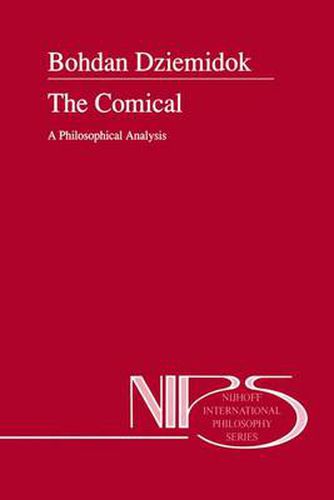Readings Newsletter
Become a Readings Member to make your shopping experience even easier.
Sign in or sign up for free!
You’re not far away from qualifying for FREE standard shipping within Australia
You’ve qualified for FREE standard shipping within Australia
The cart is loading…






This title is printed to order. This book may have been self-published. If so, we cannot guarantee the quality of the content. In the main most books will have gone through the editing process however some may not. We therefore suggest that you be aware of this before ordering this book. If in doubt check either the author or publisher’s details as we are unable to accept any returns unless they are faulty. Please contact us if you have any questions.
The problem of the comical is one of the most interesting issues in aesthetics. Its significance extends well beyond the sphere of aesthetic studies and has at tracted the attention of the scholars working in other fields such as the theorists and historians of particular art forms, sociologists, psychologists, as well as anthropologists, ethnographers and the theorists of education. Philosophy has devoted a lot of attention to the comical. Since Aristotle al most every philosopher has felt obliged to comment on this question. However, even though they have offered a number of accurate observations on the subject, the philosophers involved in the discussion about the comical have earned a reputation of being rather devoid of the sense of the comical and many a time their considerations have been compared to those of a blind man talking about colours. And yet the problem of the comical kept attracting them to such an ex tent that they paid no heed to the difficulties involved and neglected the risk of becoming ridiculous themselves. Adolf Zeissing once remarked that all the litera ture on the comical is a comedy of errors committed while defining the comi cal. Yet even he could not resist the temptation of adding another page to this comedy of errors . Tadeusz Boy-Zeleriski claimed that the good thing about the philosophical writing concerning the comical is that it offers not only the theory of the comical but at the same time is the theory’s practical application.
$9.00 standard shipping within Australia
FREE standard shipping within Australia for orders over $100.00
Express & International shipping calculated at checkout
Stock availability can be subject to change without notice. We recommend calling the shop or contacting our online team to check availability of low stock items. Please see our Shopping Online page for more details.
This title is printed to order. This book may have been self-published. If so, we cannot guarantee the quality of the content. In the main most books will have gone through the editing process however some may not. We therefore suggest that you be aware of this before ordering this book. If in doubt check either the author or publisher’s details as we are unable to accept any returns unless they are faulty. Please contact us if you have any questions.
The problem of the comical is one of the most interesting issues in aesthetics. Its significance extends well beyond the sphere of aesthetic studies and has at tracted the attention of the scholars working in other fields such as the theorists and historians of particular art forms, sociologists, psychologists, as well as anthropologists, ethnographers and the theorists of education. Philosophy has devoted a lot of attention to the comical. Since Aristotle al most every philosopher has felt obliged to comment on this question. However, even though they have offered a number of accurate observations on the subject, the philosophers involved in the discussion about the comical have earned a reputation of being rather devoid of the sense of the comical and many a time their considerations have been compared to those of a blind man talking about colours. And yet the problem of the comical kept attracting them to such an ex tent that they paid no heed to the difficulties involved and neglected the risk of becoming ridiculous themselves. Adolf Zeissing once remarked that all the litera ture on the comical is a comedy of errors committed while defining the comi cal. Yet even he could not resist the temptation of adding another page to this comedy of errors . Tadeusz Boy-Zeleriski claimed that the good thing about the philosophical writing concerning the comical is that it offers not only the theory of the comical but at the same time is the theory’s practical application.